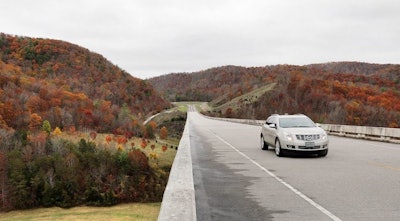
The Virginia Tech Transportation Institute will launch its new urban test track, the first in a string of expansions planned to grow its research capabilities right in time for the autonomous vehicle revolution.
When it's all complete, VTTI Smart Road Director of Operations Jared Bryson said he can't think of any roadway scenarios his team won't be able to simulate. There will be fake neighborhoods, roundabouts, bus stops, foggy highways and blind curves on country roads.
The whole track will be connected to U.S. 460, allowing scientists to begin experiments on a closed road before seamlessly driving onto public roads around Blacksburg.
The idea is to create a testbed where industry giants like Google can bring their self-driving cars to see how they perform in the variety of unpredictable environments they'll find in the real world — all in one place.
"This is a critical time in transportation research, a time in which we are realizing the future of transportation at a more accelerated pace than ever before," Tech Vice President of Research Theresa Mayer said in a news release. "Advanced vehicles are no longer a pipe dream, the spark of an idea in an engineer's imagination. These vehicles are here; they are being deployed on our nation's roads."
The Smart Road has offered scientists a closed, 2.2-mile stretch of highway since 2002, but now that's flanked by two new test tracks: an urban environment and a rural road, which is still under construction.
The tracks are all connected to each other, forming a network now called the Virginia Smart Roads.
VTTI will also break ground on its new Automation Hub. The building, located behind VTTI's other offices, will house a new internship program that will allow students to work on projects for real-world companies while in Blacksburg.
The four projects — the Automation Hub, link to U.S. 460, urban track and rural track — will cost an estimated $12 million.
VTTI showed off its new capabilities ahead of a ribbon cutting, offering rides in an autonomous Cadillac SRX. Lights along the dashboard flashed green as the driver shifted into autonomous mode and made his way through a stop light and down the highway portion of the Smart Road.
Take an exit off to the right, and a driver will be on the so-called Rural Roadway Expansion. This 3.5-mile road will be intentionally built to outdated 1965 safety standards, with narrower lanes and fewer roadway markings.
Sections of the road will be left unpaved, and designers will install landscaping to create blind curves such as drivers run into on back roads. It will have four-way intersections, bridges over creeks and steep inclines.
Researcher Mark Golusky said two-thirds of roads in the U.S. are rural, so it's important to be able to experiment in these kinds of challenging conditions.
Construction on the rural test track is expected to begin soon and should be complete by the end of 2018.
The tour finished at the Surface Street Expansion, where shipping containers were set up to simulate city buildings. The entire space is reconfigurable, with sidewalks, bus stops, building facades and lane markings that can be moved to create different city or residential driving scenarios.
A cutout of a child emerged from an alleyway during the tour, forcing the Cadillac's autonomous features to kick in and stop the car.
Bryson said these autonomous features are inching the automotive industry closer and closer to self-driving vehicles, but each feature needs to be tested in experiments like this before it's released onto public roads.
With the new testing capabilities, Tech hopes to remain a destination for that research.
"(The Smart Road) is not just a race track that's being repurposed, or a giant high-speed oval that the manufacturers have," Bryson said. "You can get into these realistic roadways that aren't replicated in the track arena. That's a very large pull for different vendors or sponsors."






















